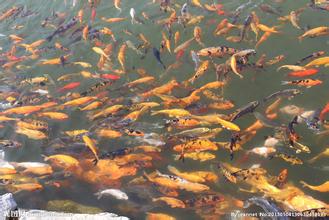
Xiaohua:To many gourmet-loving Chinese, a solution to the Asian carp invasion in the US water system can be as easy as just cooking them.
A group of US fishery experts have visited China to seek help.
The experts have also inspected carp markets in Shanghai and Wuhan, and tried to explore the possibility of selling the Asian carp to Chinese customers.
日前"亚洲鲤"在美国泛滥成灾,甚至需要专门派出专家团来中国"求救"。
消息一出,中国网友纷纷支招-西湖醋鱼、红烧鲤鱼等等。
很多中国人都不甚理解水系里的鲤鱼太多为什么就难坏了美国人呢?
Is it a fish disaster really or is it as many Chinese citizens say, it's too much food?
Heyang:Well, the fact that the US government has spent hundreds of millions of dollars to prevent the spread of Asian carp, and also it has spent nearly $100 million on research in the past four years to determine ways to impede movement and reduce carp density in rivers, seems to show that this is quite a big deal and it is quite a bit of a problem for the waterways and the environment in the US.
And what's quite funny is actually it was originally introduced to America to help the control of the spread of weeds and parasites in waters for these Asian carps to do that, and it seems like certainly now it's not working that well.
John:Yeah, and the thing is that we don't eat carp. It's too boney. You know we are used to eating things like beef, like chicken. Yes they might have bones, but it's quite actually to get around. It's just kind of annoying because do we go around and asking the French that "why do you eat horse?" So what about people in China that like to eat dogs It's the same thing in US-we don't like to eat certain things. So I kind of wish the Chinese would stop giving us such a hard time about this and just say "oh go eat it!" Chinese people are like to complain that the westerners are culturally insensitive. Why should I ask you to stop being so culturally insensitive?
Xiaohua:I don't think we are being culturally insensitive. Netizens are not saying "Go Americans! Eat carp!" They are saying "give some carps to us so we can eat them." They are really trying to think of solutions for the problem.
Heyang:And I don't really think that the Chinese are against Americans not eating it. It's mostly because in the news it says that the Asian carps are strong competitor of native fish species because of the invasive species' large size and rapid rate of reproduction that some of the local native fish species are seeing a dramatic drop in populations. So these Asian carps have really created quite dramatic influence on the landscape of these rivers.
Xiaohua:But I do think there are certain practical difficulties of solving this problem, even if we have the Chinese who eat carps. Because if you really export the carp to China, it's already been frozen and Chinese people don't like to eat frozen freshwater fish a lot.
John:A lot of it is imported in the form of fish balls, already. Frozen fish balls.
It would be a good idea. Fish balls, dried fish, salted fish, you know, make it into something that Chinese people like then that might solve the problem.
Heyang:But also it's really expensive after they've been imported to China. That's the major problem here that you can't really to the get the generally public to really want to buy it. But they can talk about it.
Xiaohua:What if you open up fishing, you know, a bit more? I think that could be an idea. And if you could catch carps, you can just keep them, or sell them.
Heyang:But I think this is a very good lesson that governments should learn that if you introduce something as trivial a little fish into your natural environment, geeze, it messes up the circle of life there.
John:Yeah people need to stop doing that. I think the world is pretty much learned the lesson already.












